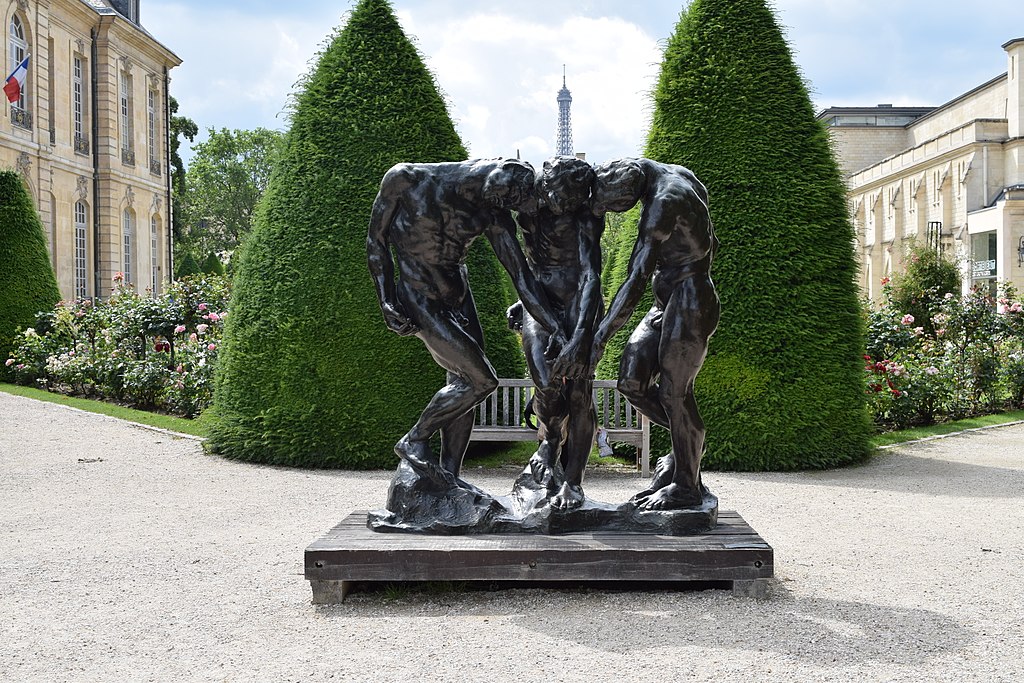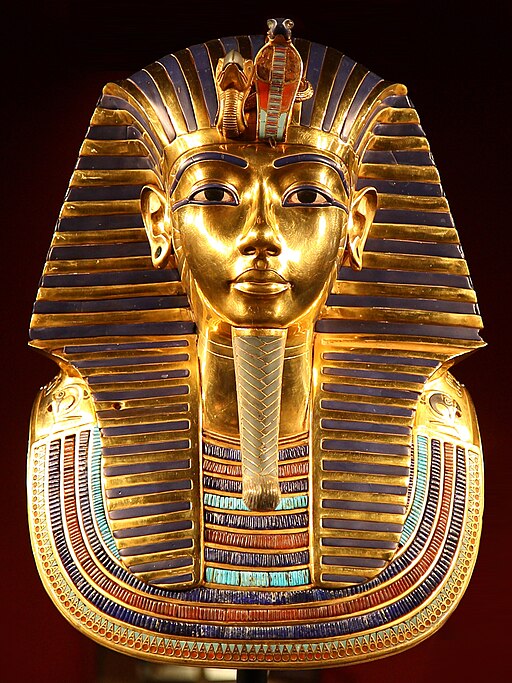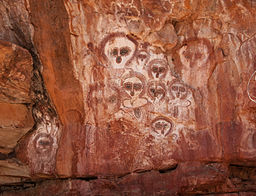
“The Three Shades” by Auguste Rodin was produced in plaster by Auguste Rodin in 1886 for his monumental sculpture “The Gates of Hell.” Then he had them enlarged to create an impressive independent group in 1904.
The downward thrust of their left arms and their heads conveys despair as they gaze down at the spectators. The Three Shades seem to be inviting the viewer to witness the drama of sin and damnation unfolding below them on The Gates.
He made several individual studies for the Shades before finally deciding to put together three identical figures gathered around a central point. The Shades are three separate casts of the same figure that has been rotated into different positions.
The angle at which the heads fall downward is so exaggerated that the necks and shoulders form an almost horizontal line. They were created for the top of The Gates looking down on the viewer.
The plaster sculpture was later cast in bronze in several editions, with such casts now exhibited at:
- Musée Rodin in Paris
- Cantor Sculpture Garden at Stanford University
- California Palace of the Legion of Honor, San Francisco
- Rodin Museum, Philadelphia
- Museo Soumaya, Mexico.

An autograph plaster copy, 1917 – Musée d’arts de Nantes.
In Dante’s Divine Comedy, The Shades, are the souls of the damned, that stand at the entrance to Hell. They point to an inscription:
“Abandon hope, all ye who enter here.”
In the Inferno, Dante describes three shades, souls of his departed countrymen, who danced in a circle as they told of their woeful state in Hades.
Rodin placed them on top of “The Gates of Hell” from where they could gaze down at the spectator. The Shades stood above the center of the lintel and personified the dead.
As in his sculpture of Adam, with his twisting and tormented pose, Rodin was influenced by Michelangelo. The shades are a variation of the Adam pose.
Through this anatomical distortion technique, Rodin achieved an expressive force quite unparalleled during his era.
When discussing his creation, Rodin said that he studied Dante for a whole year, trying to depict the eight circles of the inferno.
Finally, he began to work from nature and to depict the hell that is found in man’s mind. The project occupied 37 years of his life, adding, arranging, and removing pieces.
There are over 180 figures in the Gates. At the top, there are figures of “The Thinker” and “The Three Shades.”
Using clay, plaster molds, and a process that included live models, Rodin created sculptures that were innovative in their realism.

The Three Shades by Auguste Rodin – Legion of Honor
The bronzes made before Rodin’s death in 1917 generally were patinated almost black and flecked with green.
Auguste Rodin
Auguste Rodin is generally considered the father of modern sculpture; he possessed a unique ability to model a complex and deeply pocketed surface in clay.
Many of his most notable sculptures were criticized during his lifetime. Rodin’s most original work departed from traditional themes of mythology and allegory, he modeled the human body with realism and with personal character and physicality.
By 1900, he was a world-renowned artist and remained one of the few sculptors widely known outside the arts community.
The Three Shades
- Title: The Three Shades
- French: Les Trois Ombres
- Artist: Auguste Rodin
- Year: Modelled in plaster in 1886
- Place of Origin: France
- Museum: Rodin Museum, Philadelphia, North Carolina Museum of Art, Musée Rodin, Legion of Honor, San Francisco, Museo Soumaya, Mexico.
Rodin The Three Shades
Auguste Rodin
- Name: François-Auguste-René Rodin
- Born: 1840 – Paris, France
- Died: 1917 (aged 77) – Meudon, France
- Nationality: French
- Notable work
- Eternal Springtime (Rodin Museum, Philadelphia)
- Two Hands (Rodin Museum, Philadelphia)
- The Cathedral (Rodin Museum, Philadelphia)
- The Hand of God (Rodin Museum, Philadelphia)
- The Thinker (Rodin Museum, Philadelphia)
- The Gates of Hell (Rodin Museum, Philadelphia)
- “The Gates of Hell” by Auguste Rodin (Kunsthaus Zürich)
- The Hand from the Tomb (Rodin Museum, Philadelphia)
- The Sirens (Rodin Museum, Philadelphia)
- Young Mother in the Grotto (Rodin Museum, Philadelphia)
- Colossal Head of Saint John the Baptist (Rodin Museum, Philadelphia)
- The Secret (Rodin Museum, Philadelphia)
- The Thinker at the Rodin Museum, Philadelphia (Full Size)
- The Thinker at the Rodin Museum, Philadelphia (Medium Size)
- The Thinker ( Cleveland Museum of Art)
- The Thinker (The Legion of Honor)
- The Burghers of Calais
- Balzac (Rodin Museum, Philadelphia)
- Eve (Musée Rodin, Paris)
- Adam (Art Gallery of Western Australia)
- The Kiss (Musée Rodin, Paris)
- Orpheus and Eurydice (Metropolitan Museum of Art – MET)
- The Three Shades
The Three Shades – Auguste Rodin
Auguste Rodin – The Gates of Hell
The Gates of Hell
~~~
“I invent nothing, I rediscover.”
– Auguste Rodin
~~~
Photo Credit: Omar David Sandoval Sida / CC BY-SA (creativecommons.org/licenses/by-sa/4.0); Auguste Rodin / Public domain; Yair Haklai / CC BY-SA (creativecommons.org/licenses/by-sa/3.0)
Popular this Week








 Sponsor your Favorite Page
Sponsor your Favorite Page SEARCH Search for: Search Follow UsJoin – The JOM Membership Program
Sponsor a Masterpiece with YOUR NAME CHOICE for $5
Share this:
- Tweet
